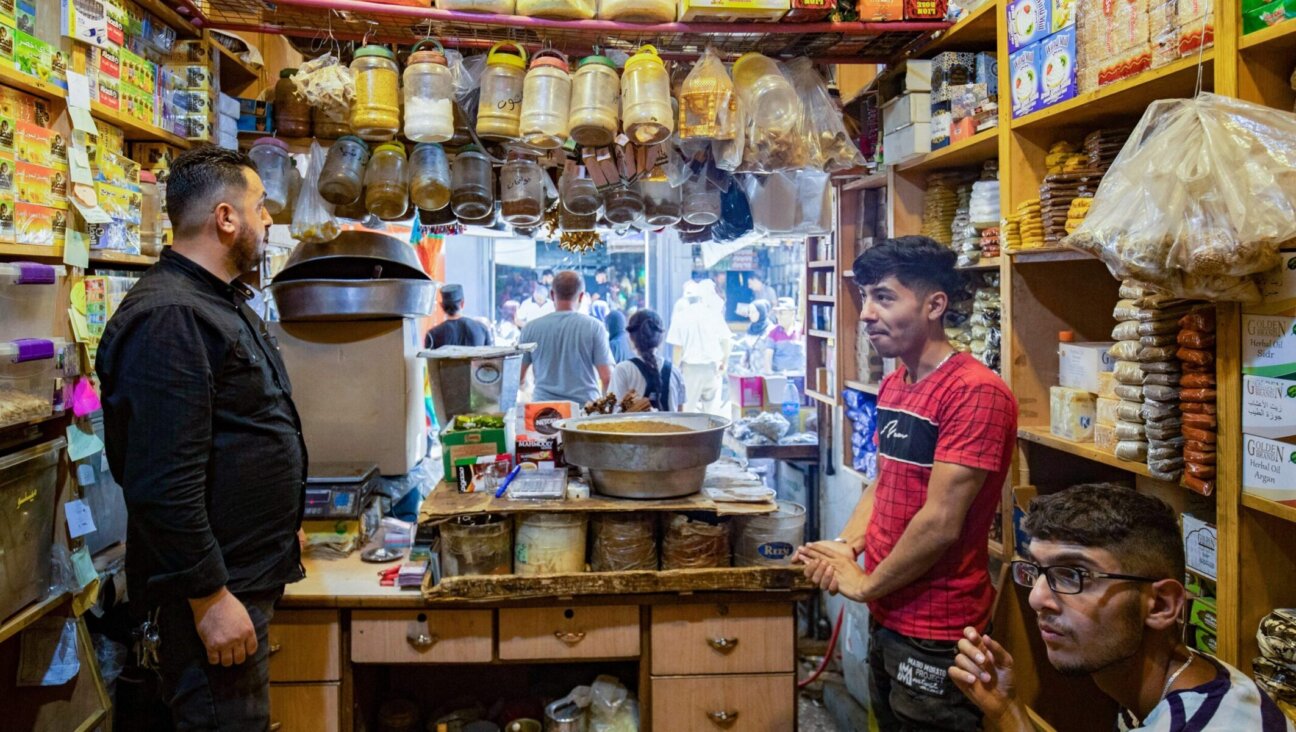This Modern Jewish Deli Is Committed To Supporting Women And Queer People

Risa Lichtman at the oven Image by BeetRoot
A decade since David Sax published Save the Deli, his rallying cry for old-school Ashkenazi food, there’s still much hand-wringing over the disappearing Jewish delicatessen.
But a new generation is rebooting the whole deli concept, sometimes in unexpected places with unconventional approaches. Manhattan’s Harry & Ida’s creates Instagrammable hybrids like carrot hot dogs; buzzy Freedmans, in LA, was Bon Appetit’s restaurant of the year for 2018.
The latest, and one of the most exciting: Beetroot, a “modern Jewish deli” that opened in Portland last month.
It’s not just through artisan takes on familiar food that owner Sonya Sanford is charting a new future for deli. “We work with local, women, POC [people of color] and immigrant-run farms and businesses to provide our customers with healthy, sustainable and nourishing foods that reflect the diversity of the Jewish diaspora,” the deli’s site proclaims.
As Sanford told the Forward on a September morning before she opened the deli’s doors, that sense of mission pervades every aspect of the business. A former food stylist, television producer, and writer, Sanford comes from a family of Ukrainian Jewish immigrants; their food traditions also inform her menus.
It’s an interesting time to open a Jewish deli. Do you think this kind of food has a future?
I think there’s a place for everyone. Super-traditional Ashkenazi New York delis have a place and fill a need. There’s also room for new forms of Jewish food. People try our matzo balls, and say, “That’s like my grandmother’s”. That’s comfort food. But the idea of comfort food has evolved. That’s why you see so many Israeli restaurants. We’re trying to tell the story of our people, and our identity, in food.
You’ve built the restaurant around values as well as food, which is also a fresh concept for a Jewish deli. How has that played out?
We’re 11 people, and completely diverse. Everyone is either a woman or non-binary-identified. Many of us are queer. We’re from different ethnicities and backgrounds. One of our cooks is a Ukraikian refugee. Not everyone’s Jewish, which is great. It was also important for us to have women and queer and non-binary people feel safe and welcome here, and that that’s reflected in our staff. The food world is changing, but it’s still male-dominated. There’s a lot of machismo in kitchens. We’re not doing that here.

Sonya Sanford Image by Sonya Sanford
You’re also committed to sourcing from women-owned businesses. Has that been a challenge?
We have amazing partners. Our coffee roaster, Marigold, is amazing – they’re women-run, with a female roaster, which is unusual. Our halva comes from Hebel and Company in LA. Soom Tahini is women-run. Even our PR firm is women/queer-owned. We’re also looking for immigrant-run and POC-run businesses as partners.
What are some of Beetroot’s signature dishes?
Our chicken and vegetarian schnitzel have been surprise hits. And I think our matzo-ball soup is realy special. It’s made with organic chicken. The mazto balls are neither floaters nor sinkers – I like a tiny bit of heft without too much density. They’re herbacious, and made with a lot of love and care.
The core recipes are family recipes – things I grew up eating, like Russian-style potato salad, Ukrainian beet salad, borscht. And the rest is seasonal inspirations between me and the chef de cuisine, Risa Lichtman, built on the canon of Jewish food. We just got some chicken livers, and we had preserved some berries. So she did a beautiful chicken mousse with pickled berries. Our seasonal salads rotate every day — today, we’ve got hummus, a chickpea salad, corn and peach arugula salad, and roasted vegetables with zaatar.

Spread at Beetroot Image by Fernando Amaro
What’s the Beetroot spin on old-school deli favorites like pastrami or lox?
Well, we’ve got really good lox and really good whitefish. We had trouble finding whitefish; it’s not popular on the West Coast, so there’s not a lot of commercial need for it. Most of it comes from the Great Lakes. It’s not an amazing carbon footprint. We’d love to source it locally and smoke it in-house. We also have a griddled pastrami on rye with house-made sauerkraut.
We have to be honest in our community about meat and seafood consumption. Climate change is real. Meat contributes to it. We’d rather serve smaller portion, and make it a treat, with high-quality meat. That super-thick pastrami sandwich? Not any more. Expectations have to change.
Has your neighborhood been receptive to Beetroot? Do people get what you’re doing?
This is a historically Jewish neighborhood. The largest and oldest synagogue in Portland is two blocks away. Today, the main Jewish neighborhood is Southwest Portland. But this neighborhood feels a little Euro to me. It’s high-density and walkable, with cute cafes. It seems to have a lot of former New Yorkers and Angelenos. And there are quite a few oeople over 60 who live in the neighborhood and come by.
Your family arrived in the US from Ukraine in 1977. Have your parents visited Beetroot?
Both of my parents are very supportive. My mother’s in Seattle. My father was a scientist who got sponsorship to emigrate from the Friday Harbor marine biology lab in Washington State. They went from a Ukrainian town to this tiny island in the Northwest. My father ended up making aliyah and becoming Haredi. Beetroot’s not certified kosher, but part of why I’m closed on Shabbat is honoring him.
A message from our Publisher & CEO Rachel Fishman Feddersen

I hope you appreciated this article. Before you go, I’d like to ask you to please support the Forward’s award-winning, nonprofit journalism during this critical time.
We’ve set a goal to raise $260,000 by December 31. That’s an ambitious goal, but one that will give us the resources we need to invest in the high quality news, opinion, analysis and cultural coverage that isn’t available anywhere else.
If you feel inspired to make an impact, now is the time to give something back. Join us as a member at your most generous level.
— Rachel Fishman Feddersen, Publisher and CEO























